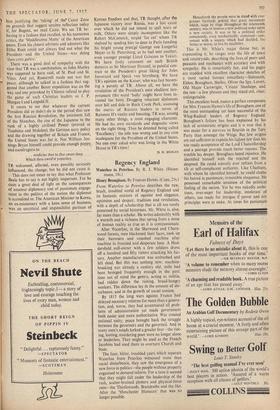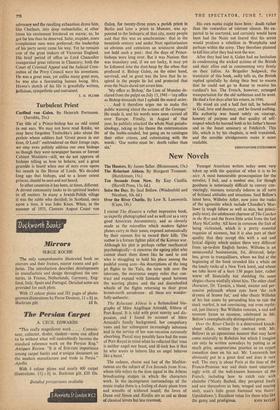Regency England
Henry Brougham. By Frances Hawes. (Cape, 25s.) From Waterloo to Peterloo describes the raw, brash, troubled world of Regency England and its fantastic mixture of squalor and elegance, optimism and despair, tradition and revolution, with a depth of scholarship that is all too rarely possessed by social historians Mr. White is, also, far more than a scholar. He writes admirably with a warmth and a richness that spring from a sense of human reality as true as it is compassionate.
After Waterloo, in the Sherwood and Charn- wood forests, men blackened their faces, took up their hammers and smashed machine after machine in frenzied and desperate hate. A Hud- dersfield. mill-owner with a few soldiers drove off a hundred and fifty rioters attacking his fac- tory. Another manufacturer was ambushed and left dead. But this was nothing new; machine- breaking was already a century old; mills had been besieged frequently enough in the past; time out of mind the gentry, acting as militia, had ridden down the rioting, bread-hungry workers. The difference lay in the amount of dis- turbance; and in the growth of social tension.
By 1815 the long wars against France had delayed necessary reforms for more than a genera- tion, and, worse, they had accentuated all prob- lems of administration yet made government both easier and more authoritative. War created national unity; peace brought back the struggle between the governors and the governed. And in many men's minds lurked a greater fear—the riot- ing, looting, murdering poor were no longer alone or leaderless. They might be used as the French Jacobins had used them to overturn Church and State.
The four, bitter, troubled years which separate Waterloo from Peterloo witnessed more than social disturbance, they saw the emergence of a new force in politics—the people without property organised to demand reform. For a time it seemed that they might fall under the leadership of the rash, scatter-brained plotters and physical-force men—the Thistlewoods, Brandreths and the like. After the 'Manchester Massacre' that was no longer possible. Henceforth the people were to stand with ever greater fortitude behind that great movement which, stage by stage throughout the nineteenth century, was to impose a new political order upon a new society. It was to be a political order consciously, even mechanically, contrived—con- sonant with a society which had decided, for better or worse, to live by machines.
This is Mr. White's major theme but, in expounding it, he ranges over the life of town and countryside, describing the lives of peers and
peasants and mechanics with accuracy and with sympathy. He is remarkably fair, and his pages are studded with excellent character sketches of a most varied human miscellany—Sidmouth, Eldon, Brougham, Shelley, Oliver the Spy, Lovett, Old Major Cartwright, 'Citizen' Stanhope, and the rest—a few phrases and they stand out, clear, unforgettable.
This excellent book makes a perfect companion for Mrs. Frances Hawes's life of Brougham, one of the most .outstanding yet least successful of the Whig-Radical leaders of Regency England.
Brougham's ftlilure has been explained by his lack of aristocratic origins and it is true that it was easier for a parvenu to flourish in the Tory Party than amongst the Whigs. But low origins are not sufficient to explain his failure nor does his
too ready acceptance of the Lord Chancellorship and a peerage provide much better reasons. The trouble lay deeper. Brougham hated injustice. He identified himself with the rejected and the.
despised. He could scarcely ever refrain from a tilt at self-complacent authority. Like Chatham, with whom he identified himself, he could clothe his hatred in passionate, irresistible eloquence. He possessed remarkable intuition of the political feeling of the nation. Yet he was nakedly ambi- tious, over-eager for leadership, intolerant of others, too ready for intrigue if power and not principles were at stake. At times his passionate advocacy and the resulting exhaustion drove him, like Chatham, into deep melancholia; at other times his excitement bordered on mania; so, he got far less than he deserved. Safer, stupider, more Complaisant men were preferred;.Ahe leadership of his party never came his way. Yet he remains one of the great makers of Victorian England. His brief period of office as Lord Chancellor inaugurated great reforms in Chancery; both the Court of Criminal Appeal and the Judicial Com- mittee of the Privy Council were his inventions. He was a great man, yet unlike many great men, he was also a fascinating human being. Mrs. Hawes's sketch of his life is gracefully written, judicious, sympathetic and restrained.
J. H. PLUMB



































 Previous page
Previous page